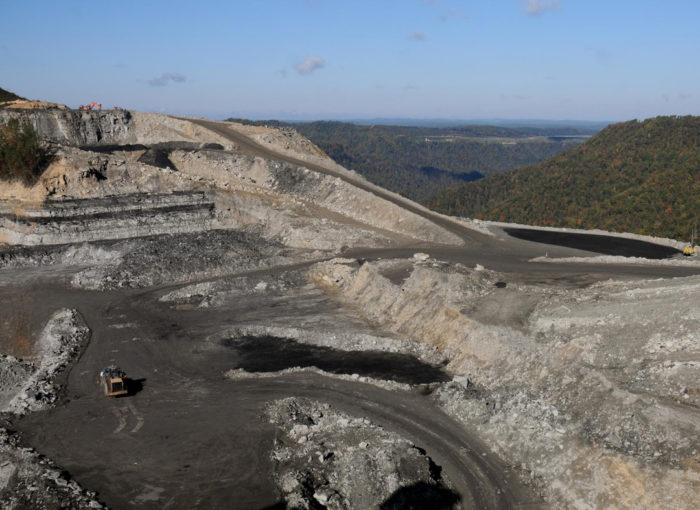
Image Credit: James Holloway / CC BY-NC 2.0 / Flickr
A study of the impacts on human health of removing whole mountaintops for the underlying coal has been stopped by the Interior Department so the agency can conduct a budgetary review.
The New York Times reports that the National Academies of Sciences, Engineering and Medicine announced the development in a statement on August 21, saying it had been ordered to cease all work on the study that was originally launched by the Obama administration.
The wide-ranging study focused on the potential health risks to people who live near surface coal mines in central Appalachia, where coal companies have topped hundreds of mountains and pitched the debris into surrounding valleys. The Interior Department said that it was conducting a review of all cooperative agreements of more than $100,000 “largely as a result of the Department’s changing budget situation.”
The practice of topping mountains for the underlying coal started in the 1960s and has since involved at least 500 peaks in the Appalachians. The debris contains heavy metals, sometimes in high concentrations, that have been linked to elevated mortality rates along with increases in lung cancer and kidney disease.
West Virginia last year asked the federal government to examine the health impact of mountaintop mining, leading to the appointment of the 12-person panel and the start of the $1 million study.
A spokesman for the National Mining Association said that the Interior Department may have been justified in stopping the study, The Times said, because the National Institute of Environmental and Health Sciences had concluded in July there was “no conclusive evidence” linking mountaintop removal with health effects.
Rep. Raúl Brijalva of Arizona, a Democrat on the House Committee on Natural Resources, saw it differently. “Mountaintop removal mining has been shown to cause lung cancer, heart disease and other medical problems,” he said. “Stopping this study is a ploy to stop science in its tracks and keep the public in the dark about health risks as a favor to the mining industry, pure and simple.”
Oil and gas interests said to be nervous
President Donald Trump has repeatedly pledged to promote coal mining while rolling back environmental roadblocks that hamper industry. In public, the fossil fuel industry has been enthusiastic, but Politico reports that industry representatives express fears privately that the president’s rollback of environmental regulations could backfire.
Executives worry that if regulations on pipelines, fracking, and offshore drilling are relaxed too much, it could set the state for an environmental disaster like the BP oil spill in the Gulf of Mexico in 2010, which was a PR debacle for the oil industry as well a serious blow to the region’s environment.
Politico quoted one oil and gas company source as saying, “It’s not helpful if regulations are streamlined so as to allow something to happen — say, a methane explosion or a spill — and we’d be painted with it as an entire industry.”
Politico also noted that some large energy producers have already spent money to comply with Obama-era regulations and worry about being undercut should the president rescind or modify the rules. Further, the industry likes regulatory certainty and is uneasy with Trump’s plans to renegotiate trade deals such as NAFTA.
Weekly Newsletter
Get building science and energy efficiency advice, plus special offers, in your inbox.














3 Comments
Good lord
"Rep. Raúl Brijalva of Arizona, a Democrat on the House Committee on Natural Resources, saw it differently. “Mountaintop removal mining has been shown to cause lung cancer, heart disease and other medical problems,” he said. "Stopping this study is a ploy to stop science in its tracks and keep the public in the dark about health risks as a favor to the mining industry, pure and simple."
I have a message for Rep Brijalva, the environmental impact of mining is well known and has been known for decades. Some residents people accept those dangers and some do not. Spending taxpayer money on the environmental impact of mining is akin to spending taxpayer money on the health effects of tobacco.
Well known by who?
I see your point John Clark and I agree that the environmental impacts of mining could be compared to spending tax dollars on studying health effects of tobacco. (Are you old enough to remember when this was questioned, too?) But to say that "some people accept those dangers and some do not" implies that the residents have a choice in what the mining companies upstream of their water supply do or do not do. Perhaps I misunderstood your perspective.
@Inger
They do have a choice.
#1 They can choose not to work for the mining companies.
#2 The gov't could respect private property rights and thereby allow its citizens to obtain monetary damages for pollution caused by upstream mining operations.
A respect for private property rights alone would make mining cost prohibitive ironically however govt and more specifically the EPA allow industry to pollute/poison where the argument is usually over how much.
Log in or create an account to post a comment.
Sign up Log in